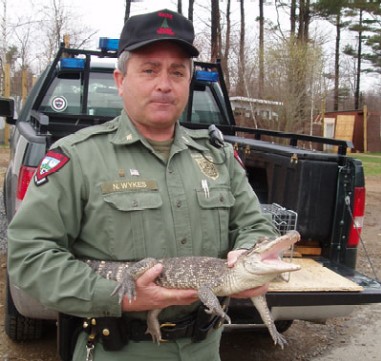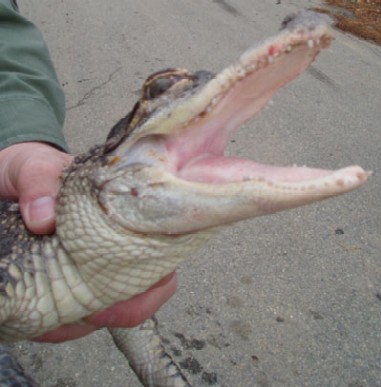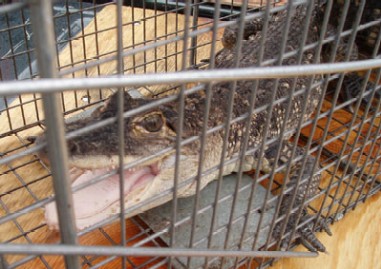
April 30, 2006
Earlier this week, Cryptomundo made mention of crocs in Maine’s fictional Lake Placid, and now there’s been an actual report of an alligator found in the state. Thank goodness the Cryptomundo blog was just a coincidence.

The coastal Village Soup online news source noted that on Saturday, April 22, 2006:
Maine Game Warden Neal Wykes received an emergency call from Judy Walker, an employee at Maine Audubon. “A three-foot alligator had been found in a farm pond on Maine Audubon property in Falmouth,” she told Wykes. Wykes rushed to this unusual call, possibly wondering if it was a hoax.
“When I arrived,” said Wykes, “there were approximately six people all gathered at one end of the pond. The alligator was in the cat-o’-nine-tails on the surface.”
Wykes observed a person wearing chest waders in the shallow pond heading slowly toward the alligator. Being a cold-blooded animal, the 50-degree water and cool weather would not bode well if it was left in the pond. The alligator had to come out.

“The fellow in the water put on a heavy pair of gloves and picked the alligator up out of the water and then placed it in a Havahart live trap,” said Wykes.
According to Wykes, the gator was pretty cold and sluggish, and offered no resistance to its excited rescuers.
Eventually, after spending some time in Wykes’ home bathtub, the alligator was relocated last Monday. Tourists coming to Maine can see this wonder as soon as York, Maine’s Wild Kingdom opens for the summer. According to the game warden, it has been placed in an exhibit with two adult and one smaller alligator.
“This is obviously a case where someone had this alligator as a pet and it either got too big to handle or the owner just didn’t want to bother with it anymore,” said Wykes. “They apparently decided to release it in the farm pond at the Audubon Center knowing that someone would likely find it and have it properly taken care of.”
It is illegal to even possess an alligator in the state of Maine. Releasing any exotic animal into the wild in Maine is another violation of the state’s wildlife laws.
“In 25 years of service, I have to say that this is a new one for me,” said Wykes.

On Monday, May 1, 2006, local opininated television nature commentator Bill Green will have a report (“The Alligator in a Pond”) on Portland’s Channel 6-NBC, discussing this recent find of a crazy croc (a subject of much study in some cryptozoological circles) in the Gilsland Farm Pond.
While this 2006 Falmouth story might be Maine Game Warden Neal Wykes’ first-ever Maine alligator, they have been found before in the southern part of the state.
In USA Today for September 20, 2000, an alligator reportedly was found in a pond a week previous, in Kennebunkport, Maine (population 1,200), a seaside resort town on Route 9 located about 26 miles south of Portland. Kennebunkport was then covered in Secret Service personnel due to Walker’s Point being the former President George Herbert Walker Bush’s summer residence, and his son’s election campaign being in full force.
USA Today, page 6, detailed the event, in full, this way:
An alligator that nipped at a man’s trousers was likely someone’s pet that was set free, police said. William Sartry shot the 31-inch-reptile dead. He said the alligator approached him while he was walking around a pond in his back yard. “You’re going to think I’m nuts,” Sarty told a police dispatcher when he reported the incident.
Finally, Maine has two alligator-named local bodies of water. Such watery sites are almost always named after their shapes. However, some rumored reports of large lizards and perhaps old reports of ‘gators have been linked to the ones in Maine. Alligator Lake is a lake in Hancock County, Maine. It has an elevation of 465 feet, and is found in grid T34 MD. Meanwhile you can find a Alligator Pond, in TAR11 WELS, Piscataquis County.
Map names sometimes are changed due to developers’ worries. Rattlesnake-named locations in southern Maine have disappeared. Rattlesnake Hill was renamed first, for example, Panther Hill, near Panther Pond, northeast of Sebago Lake. Sadly, today these “Rattlesnake” and “Panther” sites in Maine are all vanishing, being replaced by the subdivision friendly “Crescent Lake” moniker in the North Raymond-Raymond area.
About Loren Coleman
Loren Coleman is one of the world’s leading cryptozoologists, some say “the” leading living cryptozoologist. Certainly, he is acknowledged as the current living American researcher and writer who has most popularized cryptozoology in the late 20th and early 21st centuries.
Starting his fieldwork and investigations in 1960, after traveling and trekking extensively in pursuit of cryptozoological mysteries, Coleman began writing to share his experiences in 1969. An honorary member of Ivan T. Sanderson’s Society for the Investigation of the Unexplained in the 1970s, Coleman has been bestowed with similar honorary memberships of the North Idaho College Cryptozoology Club in 1983, and in subsequent years, that of the British Columbia Scientific Cryptozoology Club, CryptoSafari International, and other international organizations. He was also a Life Member and Benefactor of the International Society of Cryptozoology (now-defunct).
Loren Coleman’s daily blog, as a member of the Cryptomundo Team, served as an ongoing avenue of communication for the ever-growing body of cryptozoo news from 2005 through 2013. He returned as an infrequent contributor beginning Halloween week of 2015.
Coleman is the founder in 2003, and current director of the International Cryptozoology Museum in Portland, Maine.
Filed under Breaking News, Cryptotourism, CryptoZoo News, Cryptozoologists, Cryptozoology, Evidence, Eyewitness Accounts, Forensic Science, Lake Monsters, Out of Place, Swamp Monsters, Television